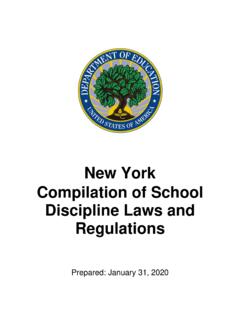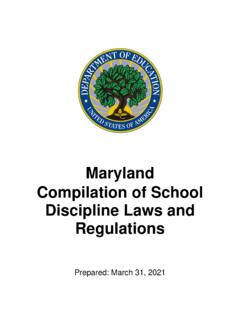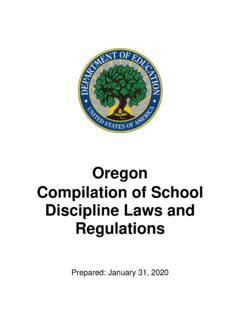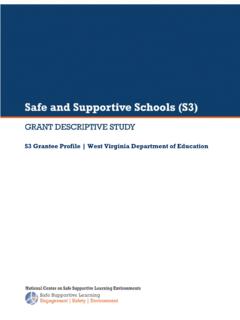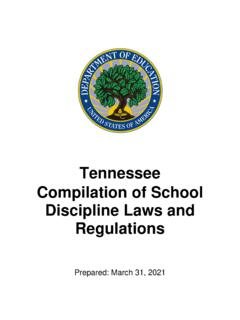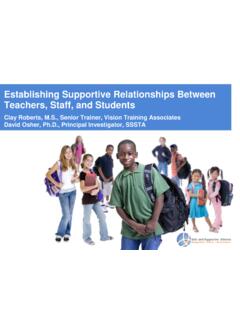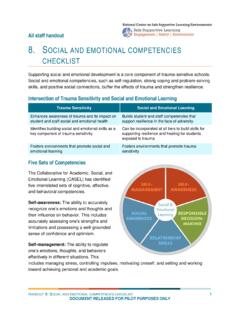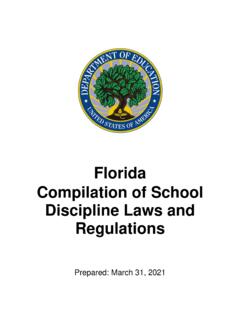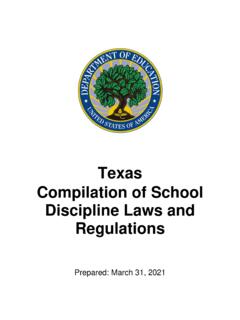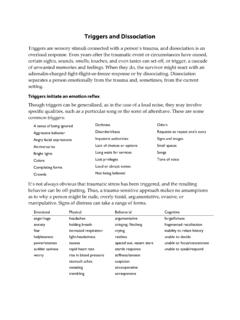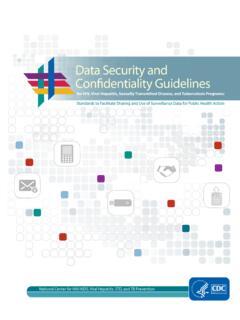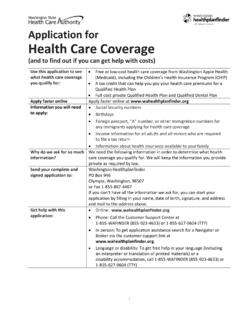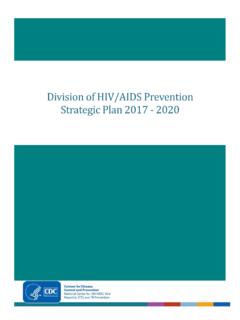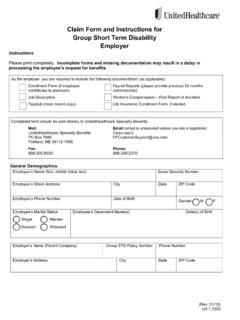Transcription of Building Sustainable Programs - ed
1 Building Sustainable Programs : The Resource Guide March 2014 The Office of Adolescent Health would like to thank the OAH staff, ICF International, and the OAH grantee work group for their contributions and support. The OAH grantee work group included: Jessica Aufrichtig, Expectant and Parenting Teens Program Coordinator School and Family Support Bureau, New Mexico Public Education Department Kirsten Black, Instructor University of Colorado Denver, Anschutz Medical Campus Erica Chavez, Prevention Coordinator Touchstone Behavioral Health, Teen Pregnancy Prevention Program Kim Clark, Project Coordinator HIV/STD and Teen Pregnancy Prevention, San Bernardino County Superintendent of Schools Shannon Flynn, Director of Research and Evaluation South Carolina Campaign to Prevent Teen Pregnancy Christine Heyen, Safer Futures Grant Coordinator Crime Victims Services division , Oregon Department of Justice Estelle Raboni, Project Director Changing the Odds Program, Morris Heights Health Center This publication was made possible through support from contract # HHSP23320095631WC to Child Trends, Inc.
2 , through funds from the Department of Health and Human Services (HHS), Office of Adolescent Health. CONTENTS Section I: Understanding the Sustainability Resource 1 Introduction .. 1 What Does Sustainability Mean .. 1 What Challenges Are Faced .. 2 Why Is It Important to Develop a Sustainability 3 About This Guide .. 3 How to Use This Guide .. 5 Who Should Use This Section II: Measuring 7 Sustainability Worksheets .. 8 Section III: Implementing a Sustainability Plan .. 13 Factor 1: Create an Action 14 Learning 14 Why Is This Important .. 14 Critical Action Steps .. 15 Sustainability 18 Factor 2: Assess the Environment .. 31 Learning 31 Why Is This Important .. 31 Critical Action 32 Sustainability 35 Factor 3: Be 51 Learning 51 Why Is This Important.
3 51 Critical Action 52 Sustainability 53 Factor 4: Secure Community 61 Learning 61 Why Is This Important .. 62 Critical Action 62 Sustainability 65 Factor 5: Integrate Program Services Into Local 75 Learning 75 Why Is This Important .. 75 Critical Action 76 Sustainability 77 Factor 6: Build a Leadership Team .. 83 Learning 83 Why Is This Important .. 83 Critical Action 84 Sustainability 87 Factor 7: Create Strategic Partnerships .. 97 Learning 97 Why Is This Important .. 97 Critical Action 97 Sustainability 102 Factor 8: Secure Diverse Financial 117 Learning 117 Why Is This Important .. 117 Critical Action 118 Sustainability 120 Section IV: Conclusion .. 133 Appendices.
4 135 Appendix A: Sustainability 135 Appendix B: Additional 149 Appendix C: OAH Grantee Examples of Sustainability .. 157 SECTION I: UNDERSTANDING THE SUSTAINABILITY RESOURCE GUIDE SECTION I: UNDERSTANDING THE SUSTAINABILITY RESOURCE GUIDE INTRODUCTION An important step towards improving the health and well-being of adolescents and enabling them to become healthy, productive adults is to sustain Programs that reduce their health risks and promote their positive 1 Meaningfully and consistently supporting young people, however, requires planning, leadership, and collaboration to facilitate Sustainable impacts in adolescent health promotion and disease prevention. Building Sustainable Programs : The Resource Guideis part of a collection of resources developed for Department of Health and Human Services, Office of Adolescent Health (OAH) grantees, which provides guidance to help Programs and services achieve Sustainable impacts.
5 This guide includes practical tips and activities that will help grantees develop a long-term sustainability plan. However, as discussed below and in OAH s accompanying Building Sustainable Programs : The Framework, before planning for sustainability grantees must first formulate their own concept of sustainability and determine their own sustainability planning goals. WHAT DOES SUSTAINABILITY MEAN? Sustainability can mean different things in different contexts. To some, it is simply a continuity of services the ability to carry on program services through funding and resource shifts or 2 To OAH grantees, sustainability can mean institutionalizing services; adapting to constant changes in technology, policies, and funding streams; creating a legacy; and/or sharing 1 Guinosso, S. & Elnicki, J. (2013). Beyond the Finish Line: Planning for Sustainability. Department of Health and Human Services, Administration for Children and Families, You and Families, Family and Youth Services Bureau, Adolescent Pregnancy Prevention division : Washington, DC.
6 2 Johnson, K., Hays, C., Center, H., & Daley, C. (2004). Building capacity and Sustainable prevention innovations: A sustainability planning model. Evaluation and Program Planning, 27(2), 135-149. A PERSPECTIVE ON SUSTAINABILITY Sustainability is effectively leveraging partnerships and resources to continue Programs , services, and/or strategic activities that result in improvements in the health and well-being of adolescents. Department of Health and Human Services, Office of Adolescent Health. (2013). 1 6,7 ACHIEVING SUSTAINABILITY Sustainability creating and Building momentum to maintain community-wide change by organizing and maximizing community assets and resources. It means institutionalizing policies and practices within communities and organizations. From the outset, sustainability requires an approach that emphasizes the development of a network of community practitioners who understand and can lead a [public health movement].
7 It also means involving a multiplicity of stakeholders who can develop long-term buy-in and support throughout the community for a coalition s efforts. These factors are crucial to ensuring lasting change and making a difference in people s lives. Batan, M., Butterfoss, , Jaffe, A., & LaPier, T. Healthy communities program: Sustainability planning guide. Center for Disease Control and Prevention: Washington, DC. SECTION I: UNDERSTANDING THE SUSTAINABILITY RESOURCE GUIDE positive outcomes to get local buy-in and provide high-quality 3,4 With all these concepts of sustainability, there are also a number of ways grantees can operationalize the concept of sustainability, including continuing organizational ideals, principles, and beliefs; upholding existing relationships; and/or maintaining consistent organizational 5 For OAH, the concept of sustainability is linked to its vision and mission to advance best practices that improve the health and well-being of America's adolescents, enabling them to become healthy, productive adults.
8 Acknowledging that there are many definitions of sustainability and that adolescent health Programs vary greatly, each program must develop its own concept of sustainability. OAH offers the perspective below to assist grantees in determining how to achieve Sustainable impact and develop their sustainability plan. Adolescent health Programs will be positioned to achieve Sustainable impact when they can effectively leverage partnerships and resources to continue Programs , services, and/or strategic activities that result in improvements in the health and well-being of adolescents. Grantees may use the OAH concept or their own mission or vision statement to develop their own concept of sustainability and further determine what their goals will be for their sustainability planning process. WHAT CHALLENGES ARE FACED? The sustainability of adolescent health Programs is a critical component of affecting long-term change in health-related behaviors, but many Programs and services face numerous challenges.
9 Informal conversations with OAH grantees highlight several barriers to achieving sustainability, including securing funding; providing services to special populations; strategic planning and prioritizing sustainability planning; achieving local buy-in; creating and maintaining partnerships; and securing local political 3 Chapple, S. & Rackliff, J. (August 2013). Facilitated dialogues with Office of Adolescent Health Pregnancy Assistance Fund grantees. 4 Hall, T. & Berger, A. (June 2013). Facilitated dialogues with Office of Adolescent Health Teen Pregnancy Prevention grantees. 5 Weiss, H., Coffman, J., & Bohan-Baker, M. (2002, December). Evaluation s role in supporting initiative sustainability. In fifth biannual meeting of the Urban Seminar Series on Children s Health and Safety, Cambridge, MA. Available at: 6 Chapple, S. & Rackliff, J. (August 2013). Facilitated dialogues with Office of Adolescent Health Pregnancy Assistance Fund grantees.
10 7 Hall, T. & Berger, A. (June 2013). Facilitated dialogues with Office of Adolescent Health Teen Pregnancy Prevention grantees. 2 3 SECTION I: UNDERSTANDING THE SUSTAINABILITY RESOURCE GUIDE METHODOLOGY FOR IDENTIFYING SUSTAINABILITY FACTORS A search was conducted that targeted resources focused on how community health Programs achieved sustainability and included a review of articles, reports, toolkits, resource guides, guidelines, and academic research, from peer-reviewed journals to public access articles. Additional resources identified by OAH were also reviewed and OAH grantees and leadership also provided guidance and information in identifying the sustainability factors outlined in this guide. For more information on the methodology used to identify the sustainability factors discussed herein and the research behind them, see Building Sustainable Programs : The Framework.
